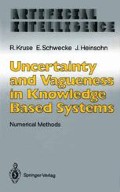Abstract
In this chapter we address the problem of aggregating a number of expert opinions which have been expressed by vague data. In our approach a meta-expert attaches nonnegative weights of importance to each of his or her experts θi ∈ Θ i = 1,..., n. Therefore we have to discuss the problem of finding suitable weights, integrating pieces of certain knowledge and giving methods for decision making. To clarify our basic idea let us consider a set Ξ (which is for the moment assumed to be finite) containing n “atomic agents” each of which is equally important. If we imagine these atomic agents voting on some motion, then the weight of some “party” A ⊆ E is given by |A|. So selecting agents ξ ∈ Ξ randomly would yield, in a long run, members of A in \( (\tfrac{1}{n}\left| A \right|\bullet 100) \frac{\hbox{$\scriptstyle 0$}}{\hbox{$\scriptstyle 0$}} P(A) = \frac{1}{n}\left| A \right| \) of all cases. Thus we consider \( P(A) = \frac{1}{n}\left| A \right| \) to be the probability of A. Unfortunately, in general not the space E but only a projection Θ is accessible, where φ may denote the point-wise projection mapping, i.e. φ: Ξ → Θ. On the intuitive level 0 represents an assembly of “floor leaders”. Thus the weight of each θ ∈ Θ is given by the “probability” of φ-(θ) = {ξ ∈ Ξ | φ(ξ) = θ}, which means it is determined by the number of supporters. So we can interpret the importance weights here as a probability (with a classical or frequentistic interpretation).
Access this chapter
Tax calculation will be finalised at checkout
Purchases are for personal use only
Preview
Unable to display preview. Download preview PDF.
Author information
Authors and Affiliations
Rights and permissions
Copyright information
© 1991 Springer-Verlag Berlin Heidelberg
About this chapter
Cite this chapter
Kruse, R., Schwecke, E., Heinsohn, J. (1991). Random Sets. In: Uncertainty and Vagueness in Knowledge Based Systems. Artificial Intelligence. Springer, Berlin, Heidelberg. https://doi.org/10.1007/978-3-642-76702-9_5
Download citation
DOI: https://doi.org/10.1007/978-3-642-76702-9_5
Publisher Name: Springer, Berlin, Heidelberg
Print ISBN: 978-3-642-76704-3
Online ISBN: 978-3-642-76702-9
eBook Packages: Springer Book Archive

